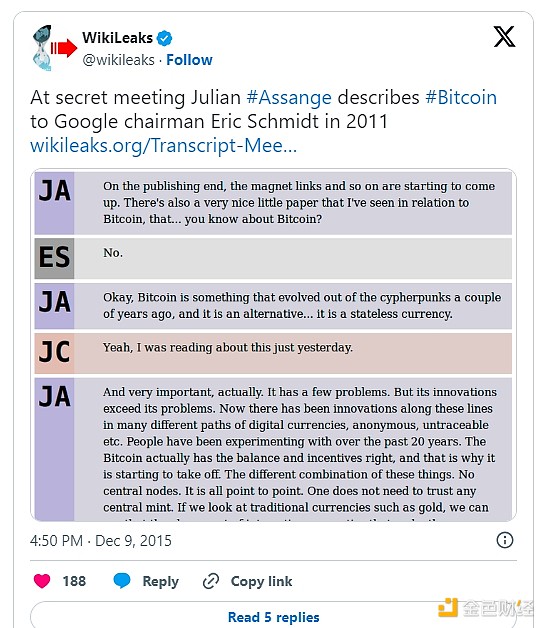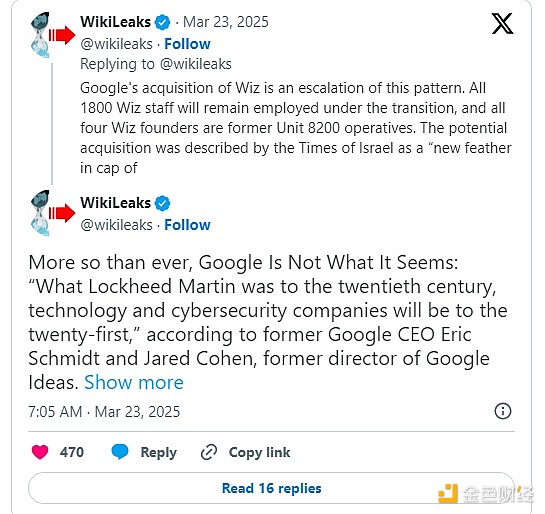Source: Blockworks; Compiled by: Tao Zhu, Golden Finance
Reviewing the official transcript of the secret five-hour meeting between Julian Assange and then-Google CEO Eric Schmidt, which was released this week 12 years ago, is equally chilling.
Schmidt collaborated with Jared Cohen, a veteran global affairs mediator and then head of the internal think tank Google Ideas (now Jigsaw), on a book called "The New Digital Age" about the intersection of American global power and social media.
The meeting was held under the pretext of researching the book, and Schmidt and Cohen visited some technology leaders at the same time. Assange published his account of the meeting in his 2014 book "When Google Met WikiLeaks."
In mid-2011, while Assange was under house arrest in rural England as he fought extradition to Sweden, WikiLeaks was still very much alive. “Schmidt dug deep, asking me directly about the organizational and technical underpinnings of WikiLeaks,” Assange wrote. WikiLeaks had just begun accepting bitcoin donations after a high-profile bank blockade severed WikiLeaks’s links with Bank of America, MasterCard, Visa, Western Union, and PayPal.
Assange thought little of the visit at the time, and thought of Schmidt as “a Silicon Valley engineer with no political ambitions, a relic of the good old days of West Coast computer science graduate student culture.”
But after gaining insight into Google’s integration with U.S. foreign policy, he saw it differently. “When WikiLeaks was deeply involved in publishing internal State Department documents, the State Department had actually infiltrated the WikiLeaks command center and asked me for free lunch.”
During the lunch, Bitcoin came up a few times. The first was a bit awkward: When Assange asked, Schmidt, who was once the director of software engineering at Sun Microsystems, curiously said he hadn’t heard of Bitcoin (Cohen said he “just read the article yesterday”).

For Schmidt and Assange, the most profound impression about Bitcoin seemed to be that it was just one manifestation of the technology.
Perhaps the global DNS regime could be overhauled to work similarly to Bitcoin, freeing the internet from centralized control, censorship, and manipulation. Like traditional financial institutions, DNS providers are vulnerable to state censorship, and Assange told Schmidt that the Chinese government was actively filtering WikiLeaks content from the country's internet.
So an internet routing system built on a global distributed ledger could allow content posted by WikiLeaks to be assigned to cryptographic hashes that are always accessible on the blockchain, just like Bitcoin.
Such a system would be particularly effective during uprisings, as governments often try to suppress citizen resistance by cutting off internet access. If a truly peer-to-peer communications network were sufficiently decentralized, it would become a technology for information freedom, just as Bitcoin is a technology for monetary freedom.
Assange was describing Namecoin, an early fork of Bitcoin based on the BitDNS concept originally proposed by Satoshi Nakamoto.
“I think we should do more research on this so that we have a rough idea of it… so that we might have more questions about it,” Schmidt told Assange, then wondered if it might be possible to crack the system’s encryption, completely undermining it.

Assange and WikiLeaks elaborate on the connection between Google and US foreign policy
Schmidt has shown interest in Bitcoin’s proof-of-work and the currency’s scarcity, thanks in large part to Assange’s clear explanation of the difficulty setting.
“What does scarcity mean for people’s incentive to join the Bitcoin system as it increases over time? It means you should join the Bitcoin system now. The sooner the better. You should be an early adopter,” Assange said. “Because one day your Bitcoin will be worth a lot of money.”
Of course, Assange was right. Since the secret meeting with the Google CEO, Bitcoin has risen 5,000 times (half a million percent).
A year later, Assange arrived in London and sought asylum in the Ecuadorian embassy, where he had been detained for seven years to avoid extradition to Sweden on rape charges. Assange then served five years in a London prison, while his team fought extradition to the United States. Last June, Assange was released as part of a plea deal with the federal government.
Meanwhile, the internet is now under intense scrutiny by governments and companies around the world, and in many cases even controlled by Google itself, while Bitcoin remains free. We can only hope that Assange's time in prison will ultimately count for something.
 Catherine
Catherine
 Catherine
Catherine Weiliang
Weiliang Alex
Alex Miyuki
Miyuki Kikyo
Kikyo Kikyo
Kikyo Weiliang
Weiliang Alex
Alex Miyuki
Miyuki Weiliang
Weiliang